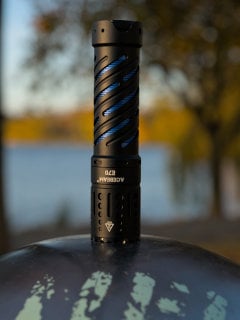Hi Anduril user’s !
I noticed that the momentary turbo does not work for 4H from the “ON” state (3H for those who do not have tint ramping).
To fix it, I have to comment out line 423:
if (! arg) { // first frame only, to allow thermal regulation to work
Do you have the same behavior?
Thank you and good day


So Mementary Turbo 3H work for you? If you don’t own multi channel, MT should be 3H from ON. I think l423 be identical for simple or multi channel.
I can’t find where arg should be equals to 0… steady_state always call with arg <> 0
Sorry for the extraneous information about the ifdef. The important part was whether adding this extra check would fix the bug in the same way as deleting the original line did.
From what I could assume in the comments, this refers to the very first state in that steady-state (“first frame”) right when you have done 4H. Then it sets the current level to the appropriate turbo (
set_level_and_therm_target).Your bug would be that it never set the level to turbo because it never executed
set_level_and_therm_targetbecause! argevaluates to false.Your bug fix was to delete the check, but that means that every instant it will keep trying to set the level to turbo instead of just setting it during the first frame and then maintaining the steady-state.
My potential fix was to add something so that the statement
if (! arg) || (! channel_has_args(cfg.channel_mode)would evaluate to true during the first frame so it can then callset_level_and_therm_targetexactly once.@[email protected] (if you have a moment) does this seem close to the mark?
I test that asap. I already try to comment it and it’s work fine :
//if (! arg) { // first frame only, to allow thermal regulation to work uint8_t tl = style_2c ? 150 : turbo_level; set_level_and_therm_target(tl); //}But I am surprised that the functionality appears in the diagram and that no one remarks that it does not work (3H without Multi channel or 4H with) https://lemmy.world/post/1038159
On reflection i think this is incorrect.
argseems to represent the output level as of when the event was triggered.